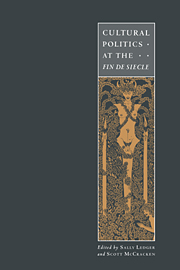Book contents
- Frontmatter
- Contents
- List of illustrations
- Notes on contributors
- Acknowledgements
- Introduction
- 1 The flight to the real
- 2 The New Woman and the crisis of Victorianism
- 3 Empire, ‘race’ and feminism at the fin de siècle: the work of George Egerton and Olive Schreiner
- 4 W. B. Yeats and Irish cultural politics in the 1890s
- 5 The double lives of man: narration and identification in late nineteenth-century representations of ec-centric masculinities
- 6 Henry James and the spectacle of loss: psychoanalytic metaphysics
- 7 ‘A very curious construction’: masculinity and the poetry of A. E. Housman and Oscar Wilde
- 8 The Pilgrims of Hope: William Morris and the dialectic of romanticism
- 9 Urban utopias: socialism, religion and the city, 1880 to 1900
- 10 Vampires and the empire: fears and fictions of the 1890s
- 11 Utopia, Limited: nationalism, empire and parody in the comic operas of Gilbert and Sullivan
- 12 Technologies of monstrosity: Bram Stoker's Dracula
- 13 Postmodernism, a Chance to reread?
- 14 Is market society the fin of history?
- Select bibliography
- Index
1 - The flight to the real
Published online by Cambridge University Press: 29 September 2009
- Frontmatter
- Contents
- List of illustrations
- Notes on contributors
- Acknowledgements
- Introduction
- 1 The flight to the real
- 2 The New Woman and the crisis of Victorianism
- 3 Empire, ‘race’ and feminism at the fin de siècle: the work of George Egerton and Olive Schreiner
- 4 W. B. Yeats and Irish cultural politics in the 1890s
- 5 The double lives of man: narration and identification in late nineteenth-century representations of ec-centric masculinities
- 6 Henry James and the spectacle of loss: psychoanalytic metaphysics
- 7 ‘A very curious construction’: masculinity and the poetry of A. E. Housman and Oscar Wilde
- 8 The Pilgrims of Hope: William Morris and the dialectic of romanticism
- 9 Urban utopias: socialism, religion and the city, 1880 to 1900
- 10 Vampires and the empire: fears and fictions of the 1890s
- 11 Utopia, Limited: nationalism, empire and parody in the comic operas of Gilbert and Sullivan
- 12 Technologies of monstrosity: Bram Stoker's Dracula
- 13 Postmodernism, a Chance to reread?
- 14 Is market society the fin of history?
- Select bibliography
- Index
Summary
The fin de siècle arrived early this century. It arrived, in fact, in the 1960s, a period whose structure of feeling uncannily reproduces much of the culture of late Victorian England. Sexual experiment, pseudo-orientalism, gospels of peace and fellowship, emancipatory politics, exotic art-forms, hallucinatory states, flights from civilization: in all these ways, the sixties seemed the eighties and nineties reanimated, with Twiggy, Conran and Carnaby Street thrown in for good measure. The postmodern 1980s and nineties have, of course, some claim to this inheritance too; but they differ from the Victorian end-of-the-century in one crucial respect. For ours is not an era of revolutionary doctrines, even if it resembles its nineteenth-century forebear in being one of global capitalist recession. The capitalist system approaches this millennium, as it did the last, in grave disarray; but the political forces which mustered around the turn of the century to offer an alternative polity to this failed experiment have been temporarily scattered and diffused.
What we seem left with in the nineties, then, is something of the culture of the previous fin de siècle shorn of its politics. For what characterized that earlier era was an astonishing amalgam of spiritual and material ferment: the boisterous emergence of new political forces, to be sure, but also a veritable transformation of subjectivity, as the high-rationalist subject of Mill or Middlemarch gradually imploded into Madame Blavatsky and Dorian Gray.
- Type
- Chapter
- Information
- Cultural Politics at the Fin de Siècle , pp. 11 - 21Publisher: Cambridge University PressPrint publication year: 1995
- 18
- Cited by



